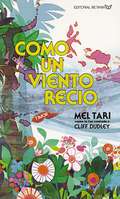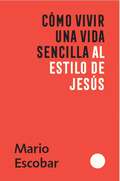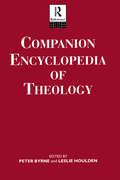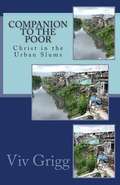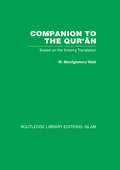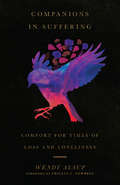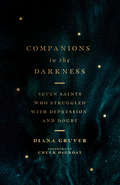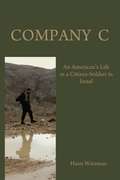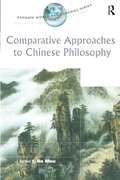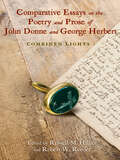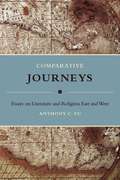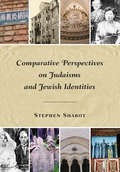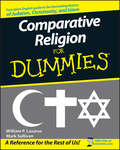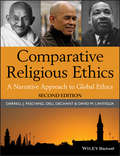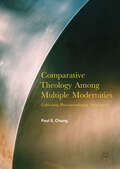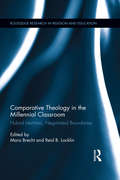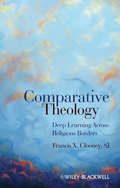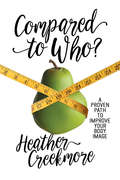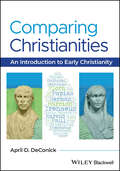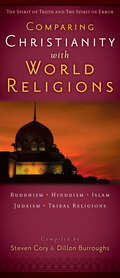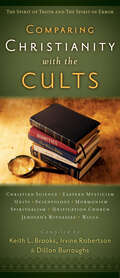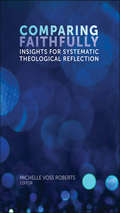- Table View
- List View
Como un viento recio
by Mel TariRelata el poder de Dios que se manifiesta hoy al igual que en los tiempos bíblicos.
Como vivir una vida sencilla al estilo de Jesús / How to Live a Simple Jesus Like Life
by Mario EscobarEl gran problema del siglo XXI es la abundancia: una abundancia que asfixia nuestra vida y la hace dependiente de las deudas, el estrés y la ansiedad. ¿Cómo esta su casa? A veces tenemos nuestro hogar lleno de cosas, pero no hay sitio para nuevas relaciones o una vida simple y ordenada. Muchos cachivaches se amontonan en garajes, trasteros o por todos lados. La gente alquila espacios para guardar cosas que no volverán a usar. ¿Ha llegado al punto en que disfruta más viendo las cosas salir de su hogar que entrar? Uno de los grandes peligros es que nuestras posesiones terminen dominando nuestra vida. La codicia es el problema del hombre desde siempre. Una parte fundamental de nuestro llamado como cristianos es la sencillez. Jesús quiere liberarte de la carga de las cosas y devolverte la alegría de una vida mucho más simple.
Companion Encyclopedia of Theology (Routledge Companion Encyclopedias)
by Peter Byrne Leslie HouldenThe Companion Encyclopedia of Theology provides a comprehensive guide to modern theological thought. An international team of theologians and practitioners of both the Christian and Jewish faiths investigate and consider aspects of theology in 48 self-contained articles. Neither partisan and denominational, nor detached and abstract, this Companion explores the resources and applications of theology in the light of Christianity's place in the modern world.The StructureThe Companion Encyclopedia of Theology is divided into six parts. The first three deal with major foundational aspects of Western theological reflection:* the Hebrew and Christian Bible* the Tradition* the contribution of PhilosophyThe second half of the Companion is concerned with application:* in relation to Spirituality* in relation to contemporary Ethics* in relation to issues in and aspects of present-day theological constructionThe 48 essays are descriptive, informative and analytical; their wide-ranging content is bound into a unified perspective by the editors' general introduction and the introductions to each of the six parts. At the end of each article, there are suggestions for further reading and the work is concluded with a comprehensive index.This Companion Encyclopedia is a valuable source of reference for students, teachers and both lay and clerical practitioners of Christian and Jewish theology.Key Features* Broad Coverage - contains 48 in-depth essays covering both the history and application of Western theological thought* International Authorship - written in non-technical language by a distinguished team of editors and authors from both Christian and Jewish faiths* Balanced Approach - discusses and analyses the key issues without imposing any single viewpoint* Clearly Presented - at the end of each article, there are suggestions for further reading and the work contains a comprehensive index
Companion to the Poor: Christ in the Urban Slums
by Viv GriggThis book encapsulates the core of new paradigms of evangelical theology - justice-oriented, while proclaiming good news, caring for those on the margins.
Companion to the Qur'an: Based on the Arberry Translation
by W.M. WattOriginally published in 1967, this Companion is designed to help readers of the Qur’an by giving them necessary background information. An account is given of ideas peculiar to the Qur’an, and the main variant interpretations are noted. A full index of Qur’anic proper names and an index of words commented on has been provided. Based on A J Arberry’s translation, this Companion can be used with other translations, or indeed with the original text, since the verses are numbered.
Companions in Suffering: Comfort for Times of Loss and Loneliness
by Wendy AlsupHave you experienced an ongoing trial that left you wrung out emotionally? Do you feel alone in your pain?
Companions in the Darkness: Seven Saints Who Struggled with Depression and Doubt
by Diana GruverThe church's relationship with depression has been fraught: for centuries, depression was assumed to be evidence of personal sin or even demonic influence. The depressed have often been ostracized or institutionalized. In recent years the conversation has begun to change, and the stigma has lessened—but as anyone who suffers from depression knows, we still have a long way to go. In Companions in the Darkness, Diana Gruver looks back into church history and finds depression in the lives of some of our most beloved saints, including Martin Luther, Charles Spurgeon, Mother Teresa, and Martin Luther King Jr. Without trying to diagnose these figures from a distance, Gruver tells their stories in fresh ways, taking from each a particular lesson that can encourage or guide those who suffer today. Drawing on her own experience with depression, Gruver offers a wealth of practical wisdom both for those in the darkness and those who care for them. Not only can these saints teach us valuable lessons about the experience of depression, they can also be a source of hope and empathy for us today. They can be our companions in the darkness.
Company C
by Haim WatzmanWhen American-born Haim Watzman immigrated to Israel, he was drafted into the army and, after eighteen months of compulsory service, was assigned to Company C, the reserve infantry unit that would define the next twenty years of his life. From 1984 until 2002, for at least a month a year, Watzman, who had never aspired to military adventure, was a soldier.Watzman was a soldier as he adjusted to his new country, raised his children, and pursued a career as a writer and translator. At times he defended his adopted country's borders; at other times he patrolled beyond them, or that gray area, the occupied territories. A religiously observant Jew who opposed Israel's presence in the West Bank and Gaza Strip, he served in uniform in conflicts that he demonstrated against in civilian clothes. Throughout, he developed a deep and abiding bond with the diverse men of Company C-a fellowship that cemented his commitment to reserve service even as he questioned the occupation he was enforcing.In this engrossing account of the first Intifada, the period of the Oslo Accords, and Israel's reoccupation of the West Bank as lived by citizen-soldiers in the field, Watzman examines our obligations to country, friends, family, and God-and our duty to protect our institutions even as we fight to reform them.
Comparative Approaches to Chinese Philosophy (Ashgate World Philosophies Series)
by Bo MouThis anthology explores how Chinese and Western philosophies could jointly and constructively contribute to a common philosophical enterprise. Philosophers with in-depth knowledge of both traditions present a variety of distinct comparative approaches, offering a refined introduction to the further reaches of Chinese philosophy in the comparative context, especially regarding its three major constituents - Confucianism, philosophical Daoism, and the Yi-Jing philosophy. This book examines various issues concerning philosophical methodology, ethics, metaphysics, epistemology, philosophy of language, and logic, and investigates both the living-spring source of Chinese philosophy and its contemporary implications and development through contemporary resources. The balanced coverage, accessible content, and breadth of approaches presented in this anthology make it a valuable resource for students of Chinese Philosophy, Comparative Philosophy, and other related courses.
Comparative Constitutional Law and Policy: Buddhism, Politics and the Limits of Law
by Benjamin SchonthalIt is widely assumed that a well-designed and well-implemented constitution can help ensure religious harmony in modern states. Yet how correct is this assumption? Drawing on groundbreaking research from Sri Lanka, this book argues persuasively for another possibility: when it comes to religion, relying on constitutional law may not be helpful, but harmful; constitutional practice may give way to pyrrhic constitutionalism. Written in a lucid and direct style, and aimed at both specialists and non-specialists, Buddhism, Politics and the Limits of Law explains why constitutional law has deepened, rather than diminished, conflicts over religion in Sri Lanka. Examining the roles of Buddhist monks, civil society groups, political coalitions and more, the book provides the first extended study of the legal regulation of religion in Sri Lanka as well as the first book-length analysis of the intersections of Buddhism and contemporary constitutional law.
Comparative Essays on the Poetry and Prose of John Donne and George Herbert: Combined Lights
by Greg Miller Kimberly Johnson Helen Wilcox Kirsten Stirling Kate Narveson Angela Balla Anne-Marie Miller-Blaise Robert W. Reeder Danielle A. Hilaire Christopher T. HodgkinsThis book brings together ten essays on John Donne and George Herbert composed by an international group of scholars. The volume represents the first collection of its kind to draw close connections between these two distinguished early modern thinkers and poets who are justly couples because of their personal and artistic association. The contributors' distinctive new approaches and insights illuminate a variety of topics and fields while suggesting new directions that future study of Donne and Herbert might take. Some chapters explore concrete instances of collaboration or communication between Donne and Herbert, and others find fresh ways to contextualize the Donnean and Herbertian lyric, carefully setting the poetry alongside discourses of apophatic theology or early modern political theory, while still others link Herbert's verse to Donne's devotional prose. Several chapters establish specific theological and aesthetic grounds for comparison, considering Donne and Herbert's respective positions on religious assurance, comic sensibility, and virtuosity with poetic endings.
Comparative Journeys: Essays on Literature and Religion East and West (Masters of Chinese Studies)
by Anthony YuThroughout his academic career, Anthony C. Yu has employed a comparative approach to literary analysis that pays careful attention to the religious and philosophical elements of Chinese and Western texts. His mastery of both canons remains unmatched in the field, and his immense knowledge of the contexts that gave rise to each tradition supplies the foundations for ideal comparative scholarship. In these essays, Yu explores the overlap between literature and religion in Chinese and Western literature. He opens with a principal method for relating texts to religion and follows with several essays that apply this approach to single texts in discrete traditions: the Greek religion in Prometheus; Christian theology in Milton; ancient Chinese philosophical thought in Laozi; and Chinese religious syncretism in The Journey to the West. Yu's essays juxtapose Chinese and Western texts-Cratylus next to Xunzi, for example-and discuss their relationship to language and subjects, such as liberal Greek education against general education in China. He compares a specific Western text and religion to a specific Chinese text and religion. He considers the Divina Commedia in the context of Catholic theology alongside The Journey to the West as it relates to Chinese syncretism, united by the theme of pilgrimage. Yet Yu's focus isn't entirely tied to the classics. He also considers the struggle for human rights in China and how this topic relates to ancient Chinese social thought and modern notions of rights in the West. "In virtually every high-cultural system," Yu writes, "be it the Indic, the Islamic, the Sino-Japanese, or the Judeo-Christian, the literary tradition has developed in intimate-indeed, often intertwining-relation to religious thought, practice, institution, and symbolism." Comparative Journeys is a major step toward unraveling this complexity, revealing through the skilled observation of texts the extraordinary intimacy between two supposedly disparate languages and cultures.
Comparative Perspectives on Judaisms and Jewish Identities
by Stephen SharotProvides sociological analyses of religious developments and identities in both historical and contemporary Jewish communities.
Comparative Religion For Dummies
by Mark Sullivan William P. LazarusUnderstand the beliefs, customs, and rituals of each faithThe fun and easy way to know the common elements of these widespread religionsWant to know more about the faiths of Judaism, Christianity, and Islam? This plain-English guide traces their evolution from their commonorigin - Abraham - and explains their different, yet linked, beliefs.You'll see how each religion developed, endured setbacks, and became a fixture in modern society - and you'll learn how members havedeveloped similar approaches to worship.Discover:How the belief in one God originatedThe roots of Abraham's family treeThe sacred texts of each faithMajor similarities and differencesHow these religions influenced the world
Comparative Religious Ethics
by Darrell J. Fasching David M. Lantigua Dell DechantThis popular textbook has been thoroughly revised and updated to reflect recent global developments, whilst retaining its unique and compelling narrative-style approach. Using ancient stories from diverse religions, it explores a broad range of important and complex moral issues, resulting in a truly reader-friendly and comparative introduction to religious ethics. A thoroughly revised and expanded new edition of this popular textbook, yet retains the unique narrative-style approach which has proved so successful with studentsConsiders the ways in which ancient stories from diverse religions, such as the Bhagavad Gita and the lives of Jesus and Buddha, have provided ethical orientation in the modern worldUpdated to reflect recent discussions on globalization and its influence on cross-cultural and comparative ethics, economic dimensions to ethics, Gandhian traditions, and global ethics in an age of terrorismExpands coverage of Asian religions, quest narratives, the religious and philosophical approach to ethics in the West, and considers Chinese influences on Thich Nhat Hanh's Zen Buddhism, and Augustine's ConfessionsAccompanied by an instructor's manual (coming soon, see www.wiley.com/go/fasching) which shows how to use the book in conjunction with contemporary films
Comparative Theology Among Multiple Modernities: Cultivating Phenomenological Imagination
by Paul S. ChungThis book presents a heuristic and critical study of comparative theology in engagement with phenomenological methodology and sociological inquiry. It elucidates a postcolonial study of religion in the context of multiple modernities.
Comparative Theology in the Millennial Classroom: Hybrid Identities, Negotiated Boundaries (Routledge Research in Religion and Education #5)
by Mara Brecht Reid B LocklinThis volume explores the twenty-first century classroom as a uniquely intergenerational space of religious disaffiliation, and questions about how our work in the classroom can be, and is being, re-imagined for the new generation. The culturally hybrid identity of Millennials shapes their engagement with religious "others" on campus and in the classroom, pushing educators of comparative theology to develop new pedagogical strategies that leverage ways of seeing and interacting with their teachers and classmates. Reflecting on religious traditions such as Islam, Judaism, African Traditional Religions, Hinduism, Christianity, and agnosticism/atheism, this volume theorizes the theological outcomes of current pedagogies and the shifting contours of comparative theological discourse.
Comparative Theology: Deep Learning Across Religious Borders
by Francis X. Clooney SJDrawing upon the author’s three decades of work in comparative theology, this is a pertinent and comprehensive introduction to the field, which offers a clear guide to the reader, enabling them to engage in comparative study. The author has three decades of experience of work in the field of comparative theology and is ideally placed to write this book Today’s increasing religious diversity makes this a pertinent and timely publication Unique in the depth of its introduction and explanation of the discipline of ‘comparative theology’ Provides examples of how comparative theology works in the new global context of human religiosity Draws on examples specific to Hindu-Christian studies to show how it is possible to understand more deeply the wider diversity around us. Clearly guides the reader, enabling them to engage in comparative study
Compared to Who?: A Proven Path to Improve Your Body Image
by Heather CreekmoreSee your body image struggles as issues of the heart—then find freedom from body insecurity using five biblically rooted steps!Are you tired of clichés like "It’s what’s on the inside that counts!" or "Just love your body!" which sound encouraging but don’t really help your struggle? Then Compared to Who? is for you. It may not be grammatically correct, but it’s one question every woman should ask as she wrestles issues like:•Am I enough?•Should I try to be more beautiful?•Will anyone ever love me?•Would my life be different if I looked different?Writing from her personal battle with weight and appearance, Heather will encourage you to see your body image struggles from a fresh perspective. Heather’s humor and honesty will encourage you, while her practical, grace-based approach will offer a path to follow to find the freedom you crave.
Comparing Christianities: An Introduction to Early Christianity
by April D. DeConickA ground-breaking introductory textbook for the study of the New Testament and the first Christians, written for the next generation of students Comparing Christianities: An Introduction to the New Testament and the First Christians maps the historical rise of Christianity out of a network of early Christian movements. This major new textbook systematically explores the struggles to define the faith by presenting Christianity as the result of a lengthy process of religious consolidation which emerged from a landscape of persistent Christian diversity. The book delves into the history of the first five generations of Christians, from Paul to Origen. The first chapter considers the challenges of constructing Christian histories and offers a new model of Christian families to organize and explain the emergence and competition of different varieties of Christianity. Each successive chapter focuses on key issues that Christian leaders engaged over the centuries, demonstrating how the questions they posed and the answers they provided gave Christianity its distinct shape. As the movements competed for social advantage, Christians began identifying certain Christian movements as enemies and consolidated against them. The final chapter schematizes the Christians studied in the book into three families of Christian movements based on the particular God they worshipped and other shared patterns of thought and practice. This chapter also explains where the varieties of Christianities came from and how the process of consolidation undertaken by some churches shaped Christian identity within a forge of intolerance that still affects us today. Comparing Christianities explores the answers to questions: Who were the early Christians and what did they write? What did Christians think about sex, women, immortality, Judaism, suffering and death? What rituals did the first Christians practice, and what did their religious experiences mean to them? How did Christians live in a Roman-dominated world? How did the first Christians explain the origins of their movement?Comparing Christianities: An Introduction to the New Testament and the First Christians serves as an excellent primary textbook in undergraduate classrooms for Introduction to Christianity, Introduction to Religion, New Testament Studies, Christian Origins, World Religions, and Western World Religions, and a thought-provoking resource for anyone wishing to know more about Christianity.
Comparing Christianity with World Religions: The Spirit of Truth and the Spirit of Error
by Steven Cory Dillon BurroughsThe world has always been a melting pot of beliefs, but now more than ever, your neighbor may be part of a differing world religion. In Comparing Christ with World Religions, the truths of Christianity are compared to key beliefs of Buddhism, Hinduism, Islam, Judaism, and tribal religions. This is a most helpful tool in answering questions you or seekers have about other religious beliefs, and a handy overview for sharing your faith with others.* Formerly titled The Spirit of Truth and the Spirit of Error II
Comparing Christianity with World Religions: The Spirit of Truth and the Spirit of Error
by Steven Cory Dillon BurroughsThe world has always been a melting pot of beliefs, but now more than ever, your neighbor may be part of a differing world religion. In Comparing Christ with World Religions, the truths of Christianity are compared to key beliefs of Buddhism, Hinduism, Islam, Judaism, and tribal religions. This is a most helpful tool in answering questions you or seekers have about other religious beliefs, and a handy overview for sharing your faith with others.* Formerly titled The Spirit of Truth and the Spirit of Error II
Comparing Christianity with the Cults: The Spirit of Truth and the Spirit of Error
by Keith Brooks Dillon Burroughs Irvine RobertsonWhat constitutes a cult? How does it contrast with what the Bible says?These colorful and concise brochures will answer seven fundamental questions of life and belief. Contrasted with the truth of God's Word are cults such as Christian Science, Spiritualism, Jehovah's Witness, Scientology, Mormonism, Eastern Mysticism, Unification Church, Wicca, and others. Perfect for training or for keeping by your front door. * Formerly titled The Spirit of Truth and the Spirit of Error.
Comparing Christianity with the Cults: The Spirit of Truth and the Spirit of Error
by Keith Brooks Dillon Burroughs Irvine RobertsonWhat constitutes a cult? How does it contrast with what the Bible says?These colorful and concise brochures will answer seven fundamental questions of life and belief. Contrasted with the truth of God's Word are cults such as Christian Science, Spiritualism, Jehovah's Witness, Scientology, Mormonism, Eastern Mysticism, Unification Church, Wicca, and others. Perfect for training or for keeping by your front door. * Formerly titled The Spirit of Truth and the Spirit of Error.
Comparing Faithfully: Insights for Systematic Theological Reflection (Comparative Theology: Thinking Across Traditions)
by Michelle Voss Roberts, EditorEvery generation of theologians must respond to its context by rearticulating the central tenets of the faith. Interreligious comparison has been integral to this process from the start of the Christian tradition and is especially salient today. The emerging field of comparative theology, in which close study of another religious tradition yields new questions and categories for theological reflection in the scholar’s home tradition, embodies the ecumenical spirit of this moment. This discipline has the potential to enrich systematic theology and, by extension, theological education, at its foundations.The essays in Comparing Faithfully demonstrate that engagement with religious diversity need not be an afterthought in the study of Christian systematic theology; rather, it can be a way into systematic theological thinking. Each section invites students to test theological categories, to consider Christian doctrine in relation to specific comparisons, and to take up comparative study in their own contexts.This resource for pastors and theology students reconsiders five central doctrines of the Christian faith in light of focused interreligious investigations. The dialogical format of the book builds conversation about the doctrine of God, theodicy, humanity, Christology, and soteriology. Its comparative essays span examples from Hindu, Buddhist, Jewish, Muslim, Jain, and Confucian traditions as well as indigenous Aztec theology, and contemporary “spiritual but not religious” thought to offer exciting new perspectives on Christian doctrine.
